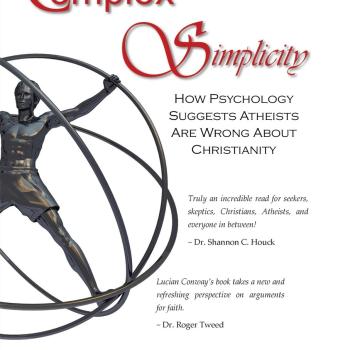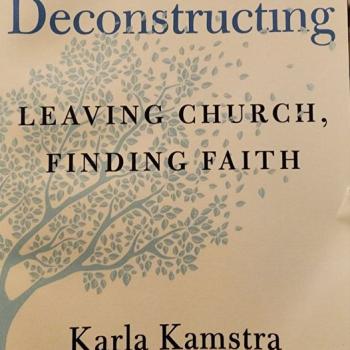
Thirty or forty years ago, investigating the phenomenon of religious deconversion would have been a challenging task. Surely people were leaving the church at that time, but finding those people and getting quality data from them would have been difficult.
In the 1960’s, for instance, Lofland and Stark had to camp out in a cult compound and observe new recruits in order to study religious conversion. Imagine camping out on a college campus waiting for students to leave the faith in order to study deconversion.
The availability of personal information in the digital age has overcome most of these challenges. Early in my work on deconversion, I discovered about a half-dozen podcasts entirely focused on interviewing people about their deconversions. Even when I wasn’t taking notes or recording data, I would still listen to these podcasts in order to gain further insights.
Of the many things I found during this process, one that gained my attention was what appeared to be an excessive use of profanity, curse words, or cussing in guests and hosts alike.
Investigating Profanity in Deconversion
As a person, I am not all research and study, I have other interests, and I mingle within the real, non-academic world. As a result, I am not unfamiliar with, or sheltered from, casual conversation and the degree to which average people or entertainers employ profanity. Based on my experience, the usage in these podcasts seemed to be above average.
To test this theory, I listened to around 2 hours of “unplugged” stand up comedy, counting the frequency in which the entertainers used foul language. I then performed the same count on 2 hours of deconversion podcasts.
Upon completion of this simple experiment, I found that the use of profanity was roughly equivalent between uncensored stand-up comedy and deconversion podcasts, with the podcasts edging out the comedy only slightly.
It is not difficult to speculate why individuals who have recently left religious environments may tend to be less guarded, or even more liberal with their usage of profanity. There has long been a stigma that when teenagers leave home, they begin trying all of the things they were forbidden at home. That when good Catholic children graduate from Catholic school, they run about and try all of the things they weren’t allowed to do in their religious environment.
Put simply, when a person’s environment constricts his or her behavior, exiting the environment causes less restrained behavior.
However, as a researcher, I did not wish to leap to any conclusions based on stereotypes and speculation. Instead, I took advantage of another feature of the digital age, and began interviewing members of digital spaces reserved for deconverts.
It seems that the conventional wisdom of people’s behavior becoming unrestrained once the restraints are removed was shared by the people who had that experience.
For instance, one user said:
Yes! I feel free to express rather than suppress the negative thoughts and feelings. I say what I think. I express how I feel. I say “****” a lot! And it feels good! Lol Even my counselor encouraged it. He said to cuss and break things and stop repressing my emotions. In church, I was always taught to be thankful no matter what. And that I needed to constantly represent Christ to the world. So every action and word was to be carefully considered. Now I can just be me.
Interview Trends
Whereas the vast majority of interviewees confirmed that their use of profanity had increased remarkably, a small percentage said that it had not. These users suggested that it seemed uncouth, unprofessional, or uneducated.
I’m just someone who has never cared for the sound of vulgarity and have always sought more poetic forms of expression. So my language didn’t change much. A lot of vulgarity just sounds uneducated to me. And deconstruction for me was about becoming more educated, not less.
Some said that, while they felt free to curse, they would avoid outright blasphemy (such as saying Jesus or God’s name as a profanity) because they did not wish to make religious people uncomfortable.
-
I did it more for a while and now I do it more selectively and NEVER blasphemous. I just would never. Because I am a Christian Agnostic now and I just don’t think there is a reason for that. Haha. My husband is still a conservative evangelical and so around him I use slang for the words (i.e. “F that” and such).
-
Definitely swear more, though interestingly tend not to use words that may be considered overtly blasphemous as I’ve no wish to cause discomfort for those who have faith.
However, more interviewees went the entirely opposite direction. They said that they went out of their way to say as much blasphemy as they could.
-
A resounding “YES” for me. 10+ years deconstructing. My most frequent curse is even “Jesus Christ”.
-
I remember the first thing I did was say ‘Jesus Christ’ out loud as ‘profanity’. honestly it changed my life. I always thought if I did that then something would happen like I would get struck by lightening. but nothing happened. then I realized maybe it was all fake, and I have felt more free ever since.
One of the more interesting trends described by an interviewee was that his use of profanity spiked initially after leaving religion, but gradually declined to be more similar to his level of use prior to leaving religion:
Yes, I swear or curse more after leaving Christianity. Why? Because it’s natural language use and for some strange reason, my Christianity had a focus on ‘purity of language’ which means not swearing. Which is actually problematic because sometimes a swear word is more appropriate. There are even studies that show that swearing increases our ability to withstand discomfort.
But there is more to the story than that. My swearing, especially blasphemy, became excessive initially, mainly as a reaction to leaving the shackles of religion. After that initial spike how much I swore reduced and is now at a level that actually isn’t that different to how much I swore as a Christian. So the effect was largely temporary.
Several other respondents echoed this user’s experience: that the spike in profanity usage was immediately following deconversion, but gradually declined over time.
Benefits of Swearing
More than a few interviewees were quick to point to various studies which indicate that the use of curse words indicate intelligence or are a helpful means of dealing with stress or pain. The latter is evidently true for the mere reason that when one uses forbidden words, one activates a specific speech center in the brain storing those words. That speech center releases dopamine as it activates, causing relaxation and reduction of pain. The degree to which this is effective varies somewhat, but it is nevertheless a thing known to happen.
The Use of Language in Religious versus Irreligious People
In 2018 a group of researchers did a study to see how the complexity of language usage differed between religious people and irreligious people. The study did a “complexity analysis” using samples of writing from religious and irreligious people, and in one case, a sample of writing of a former atheist who became a Christian – comparing his use of language as an atheist with his use of language as a Christian.
To the best of my knowledge, no similar study has been done on a person pre and post deconversion. However, the study found that the use of language among religious people was as complex, if not slightly moreso, than that used among the irreligious.
What may we Conclude?
The best conclusion for this account may be the one given by one of the interviewees when he said:
Perhaps it’s a parallel to adolescence, when kids start cussing as soon as they realize their parents can’t hear them if they’re not around. I’m no longer worried about cursing causing me to lose my salvation, so I let ‘em rip.













